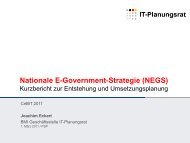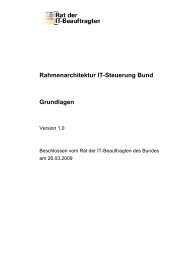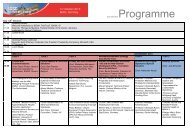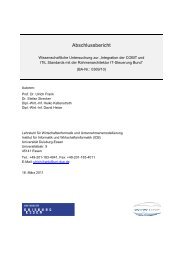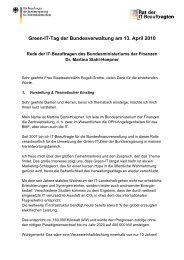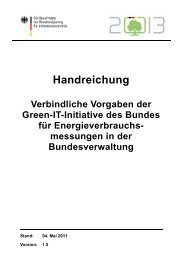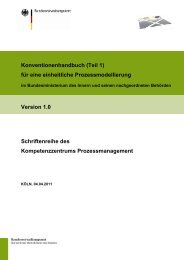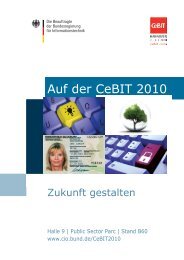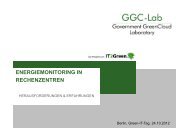Rechtliche Aspekte der Nutzung, Verbreitung und ... - Bund.de
Rechtliche Aspekte der Nutzung, Verbreitung und ... - Bund.de
Rechtliche Aspekte der Nutzung, Verbreitung und ... - Bund.de
Sie wollen auch ein ePaper? Erhöhen Sie die Reichweite Ihrer Titel.
YUMPU macht aus Druck-PDFs automatisch weboptimierte ePaper, die Google liebt.
98 6 Anhang: Texte <strong><strong>de</strong>r</strong> wichtigsten OSS-Lizenzen<br />
For example, if you distribute copies of the library, whether gratis or for a fee, you must give the recipients all<br />
the rights that we gave you. You must make sure that they, too, receive or can get the source co<strong>de</strong>. If you<br />
link other co<strong>de</strong> with the library, you must provi<strong>de</strong> complete object files to the recipients, so that they can re -<br />
link them with the library after making changes to the library and recompiling it. And you must show them<br />
these terms so they know their rights.<br />
We protect your rights with a two-step method: (1) we copyright the library, and (2) we offer you this license,<br />
which gives you legal permission to copy, distribute and/or modify the library.<br />
To protect each distributor, we want to make it very clear that there is no warranty for the free library. Also, if<br />
the library is modified by someone else and passed on, the recipients should know that what they have is not<br />
the original version, so that the original author's reputation will not be affected by problems that might be introduced<br />
by others.<br />
Finally, software patents pose a constant threat to the existence of any free program. We wish to make sure<br />
that a company cannot effectively restrict the users of a free program by obtaining a restrictive license from a<br />
patent hol<strong><strong>de</strong>r</strong>. Therefore, we insist that any patent license obtained for a version of the library must be con -<br />
sistent with the full freedom of use specified in this license.<br />
Most GNU software, including some libraries, is covered by the ordinary GNU General Public License. This<br />
license, the GNU Lesser General Public License, applies to certain <strong>de</strong>signated libraries, and is quite different<br />
from the ordinary General Public License. We use this license for certain libraries in or<strong><strong>de</strong>r</strong> to permit linking<br />
those libraries into non-free programs.<br />
When a program is linked with a library, whether statically or using a shared library, the combination of the<br />
two is legally speaking a combined work, a <strong><strong>de</strong>r</strong>ivative of the original library. The ordinary General Public License<br />
therefore permits such linking only if the entire combination fits its criteria of freedom. The Lesser<br />
General Public License permits more lax criteria for linking other co<strong>de</strong> with the library.<br />
We call this license the "Lesser" General Public License because it does Less to protect the user's freedom<br />
than the ordinary General Public License. It also provi<strong>de</strong>s other free software <strong>de</strong>velopers Less of an advantage<br />
over competing non-free programs. These disadvantages are the reason we use the ordinary General<br />
Public License for many libraries. However, the Lesser license provi<strong>de</strong>s advantages in certain special circumstances.<br />
For example, on rare occasions, there may be a special need to encourage the wi<strong>de</strong>st possible use of a certain<br />
library, so that it becomes a <strong>de</strong>-facto standard. To achieve this, non-free programs must be allowed to<br />
use the library. A more frequent case is that a free library does the same job as wi<strong>de</strong>ly used non-free li -<br />
braries. In this case, there is little to gain by limiting the free library to free software only, so we use the Lesser<br />
General Public License.<br />
In other cases, permission to use a particular library in non-free programs enables a greater number of people<br />
to use a large body of free software. For example, permission to use the GNU C Library in non-free programs<br />
enables many more people to use the whole GNU operating system, as well as its variant, the<br />
GNU/Linux operating system.<br />
Although the Lesser General Public License is Less protective of the users' freedom, it does ensure that the<br />
user of a program that is linked with the Library has the freedom and the wherewithal to run that program us -<br />
ing a modified version of the Library.<br />
The precise terms and conditions for copying, distribution and modification follow. Pay close attention to the<br />
difference between a "work based on the library" and a "work that uses the library". The former contains<br />
co<strong>de</strong> <strong><strong>de</strong>r</strong>ived from the library, whereas the latter must be combined with the library in or<strong><strong>de</strong>r</strong> to run.<br />
TERMS AND CONDITIONS FOR COPYING, DISTRIBUTION AND MODIFICATION<br />
0. This License Agreement applies to any software library or other program which contains a notice placed<br />
by the copyright hol<strong><strong>de</strong>r</strong> or other authorized party saying it may be distributed un<strong><strong>de</strong>r</strong> the terms of this Lesser<br />
General Public License (also called "this License"). Each licensee is addressed as "you".



